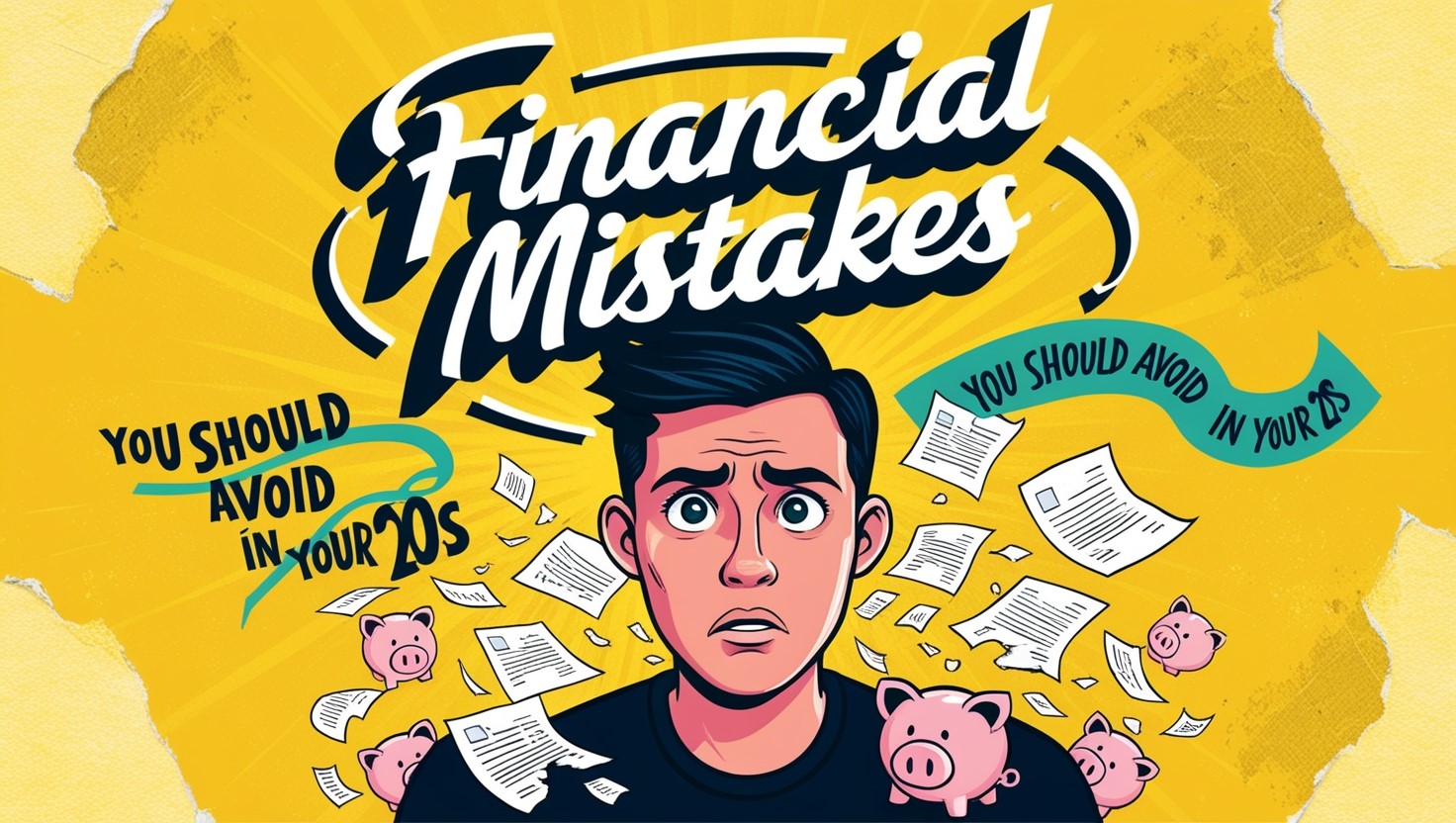Your 20s are a time of exploration and new beginnings. You’re stepping into independence, tackling your first full-time job, maybe moving into your own place, and learning to navigate life’s financial challenges. It’s exciting, but the financial decisions you make now can have a big impact on your future. Getting into good habits early can set you up for stability and success, while some missteps can lead to lasting setbacks.
For many, money management isn’t something they’re taught in school, which makes it easy to stumble into common pitfalls. Credit cards, student loans, and the allure of spending on experiences and conveniences are all part of the picture. But taking a few steps now to avoid common mistakes can make a big difference down the road.
This guide covers some of the most frequent financial missteps young adults make and offers practical ways to avoid them. By being thoughtful about your finances now, you’re setting yourself up to avoid debt and stress and create a foundation for financial freedom. Your future self will thank you for it.
1. Ignoring Budgeting and Spending without a Plan
One of the most common financial pitfalls in your 20s is skipping the budget. It’s easy to think, “I don’t need one yet,” or to assume that tracking every dollar is too restrictive. But without a plan, it’s easy to lose track of spending and find yourself short on cash when you need it most. Budgeting isn’t about limiting yourself; it’s about having control over where your money goes and making it work for you.
When you create a budget, you’re setting yourself up to see the big picture—your income, your expenses, and where you can save. Start simple: list your monthly income, note your fixed expenses (like rent and utilities), and set aside amounts for things like groceries, entertainment, and savings. Even a loose plan can help you avoid accidental overspending and make it easier to reach financial goals.
Budgeting also gives you insight into your spending habits, which can be surprisingly eye-opening. Maybe you didn’t realize how much those little daily coffee stops or weekend splurges add up. With a budget, you’re able to make adjustments, setting priorities that align with what truly matters to you.
If the thought of budgeting feels daunting, consider using a budgeting app. Many apps make it easy to track your spending in real time, offering reminders and visual summaries that can keep you on track. Building this habit in your 20s creates a foundation for financial confidence, helping you make intentional choices about your money. Budgeting isn’t just a tool; it’s the start of good habits that will support you for years to come.
2. Relying Too Much on Credit Cards
Credit cards can feel like a lifeline when you’re building your independence, offering quick access to cash and the convenience of buying now and paying later. However relying too much on credit can become a costly habit, especially if balances start to grow faster than you can pay them off. When credit card debt builds up, it brings high interest rates with it, turning small purchases into big expenses over time.
Using credit cards responsibly means treating them as tools, not as an extension of your income. Start by limiting credit card spending to amounts you know you can pay off each month. This way, you avoid the interest charges that come from carrying a balance. Paying off your balance regularly also helps to build a strong credit score, which can open doors to lower interest rates on future loans and better financial options.
Another strategy is to focus on needs over wants. It’s tempting to swipe for things like dining out, entertainment, or that must-have item on sale, but these “extras” can quickly add up. Prioritize essentials and be mindful of purchases that can wait until you have cash on hand. By keeping your credit card use in check, you’re setting yourself up for a more stable financial future, with less stress and fewer costly surprises.
Finally, if you’re carrying a balance, make it a goal to pay down your credit card debt as soon as possible. Even small extra payments each month can help chip away at what you owe and save you money on interest in the long run. Relying less on credit isn’t about restricting yourself—it’s about freeing yourself from debt and building a foundation you can feel good about.
3. Not Prioritizing an Emergency Fund
In your 20s, building an emergency fund can feel like a “someday” goal rather than a priority. But life has a way of throwing curveballs, and having a cushion to fall back on can make all the difference when unexpected expenses arise—whether it’s a car repair, a medical bill, or a sudden job change. An emergency fund is your financial safety net, helping you handle life’s surprises without having to rely on credit or loans.
Starting an emergency fund doesn’t have to mean saving thousands right away. Begin with small, achievable goals. Even setting aside a modest amount each month can add up over time and help you get in the habit of saving. Consider automating your contributions so that a portion of your income goes directly into a separate account—one that you don’t dip into for daily expenses.
Having an emergency fund provides peace of mind and financial independence, especially when you’re just starting out. Aim for an initial goal of covering at least one month’s worth of expenses, then gradually work toward three to six months as you’re able. Remember, this fund is for true emergencies, not for things like vacations or splurges.
Building an emergency fund in your 20s sets you up for greater stability and confidence. It’s about protecting yourself from the unexpected and avoiding the cycle of debt. Your future self will thank you for it, and the security it brings is worth every bit of effort.
4. Ignoring Student Loan Repayment Plans
Student loans can feel like a distant concern in your 20s, especially if you have a grace period or a few years before repayment fully kicks in. But putting off a solid repayment plan can lead to higher costs down the road. Interest keeps adding up, and if you delay too long, that balance can become much larger than you first borrowed. Facing your student loans early, rather than ignoring them, is key to keeping them manageable and minimizing stress.
Start by understanding your loan terms and available repayment options. Many people don’t realize that there are various repayment plans, from income-based options to extended schedules, that can ease the burden. Income-driven plans, for instance, adjust your monthly payment based on your current earnings, which can be a helpful tool while you’re starting out in your career. Knowing your options allows you to choose a plan that fits your budget and helps you stay on top of payments.
It’s also smart to consider paying more than the minimum whenever possible. Even small extra payments toward the principal balance can reduce the amount of interest you’ll pay over time. If your financial situation allows, making additional payments—whether it’s every month or a few times a year—can help you pay off your loan faster and with less interest overall.
Ignoring student loans doesn’t make them go away, but facing them head-on can give you a sense of control. By setting up a repayment plan early, you’re taking charge of your financial future, avoiding unnecessary debt, and building the confidence that comes from managing your responsibilities wisely.
5. Skipping Health Insurance
In your 20s, health insurance might feel like an unnecessary expense, especially if you’re generally healthy. But skipping health insurance can turn a small health issue into a major financial setback. Medical costs can add up fast, and a single unexpected visit to the ER or a sudden illness can lead to bills that take years to pay off. Health insurance isn’t just about covering the big emergencies; it’s also there to help you manage the smaller, routine care that keeps you healthy.
If you’re employed, check with your company to see if they offer health benefits—many employers cover part of the premium, making it more affordable than you might think. For those who are self-employed or don’t have coverage through work, consider exploring plans on the health insurance marketplace. You’ll find options at various price points, and depending on your income, you may even qualify for subsidies that can make coverage more manageable.
Health insurance also offers access to preventive care, which means you can catch issues before they become big problems. Routine check-ups, screenings, and basic prescriptions are often covered, giving you the chance to take care of yourself without draining your savings. Plus, having insurance often provides peace of mind, knowing that if something happens, you’re covered.
In the long run, health insurance is a smart investment in both your physical and financial well-being. Taking the step to get insured now sets you up to handle life’s surprises with less worry and more stability. After all, true security includes being prepared for the unexpected.
6. Failing to Start Retirement Savings Early
Retirement might seem like a distant concern in your 20s, but the truth is, this decade is the best time to start saving for it. Thanks to the power of compound interest, the money you set aside now has decades to grow, turning even modest contributions into significant savings by the time you retire. Waiting until later means you’ll have to save much more to reach the same goal, but by starting early, you’re setting yourself up for a more comfortable future.
If your employer offers a retirement plan like a 401(k), consider contributing enough to at least capture any matching funds they offer. Those employer contributions are essentially “free money” added to your savings, and over time, that match can make a big difference. If you’re self-employed or don’t have a 401(k) option, an Individual Retirement Account (IRA) is a good alternative, offering tax advantages and flexible contribution options.
You don’t have to contribute a large amount right away. Even a small, consistent amount each month can add up over the years. Think of it as paying your future self, one small investment at a time. As your income grows, increase your contributions gradually; you’ll barely feel the difference now, but it will have a huge impact later.
Starting your retirement savings in your 20s isn’t just a financial decision—it’s a commitment to your future peace of mind. By building this habit early, you’re taking control of your financial future, ensuring that when the time comes to retire, you’ll have the freedom to do it on your own terms.
7. Falling into Lifestyle Inflation
Lifestyle inflation happens quietly—you get a raise or a better-paying job, and suddenly, you’re tempted to upgrade everything: nicer meals out, a bigger apartment, new clothes, and gadgets. It’s natural to want to enjoy the rewards of your hard work, but letting your spending rise with your income can keep you from building real wealth. In your 20s, learning to manage lifestyle inflation can help you secure a stronger financial future without giving up what matters most.
The key is to stay mindful of where your extra income is going. Rather than letting all those extra dollars slip into new expenses, consider putting a portion toward long-term goals. Try allocating part of each raise or bonus to savings, investments, or paying down debt. This way, you can enjoy a little extra freedom in your budget while still working toward financial security.
Living below your means doesn’t mean sacrificing happiness—it’s about choosing what’s truly important. Spend on what you value most, whether it’s travel, hobbies, or self-care, but don’t feel pressured to upgrade every part of your life just because you can. By setting priorities and being thoughtful with your spending, you can avoid lifestyle inflation and still treat yourself in meaningful ways.
8. Not Building or Monitoring Credit
In your 20s, it’s easy to think that credit isn’t important yet. Maybe you’re just starting out with a credit card or have avoided taking on any credit altogether. But building and monitoring your credit early on can open doors down the road, from better rates on loans to easier approvals for renting an apartment. Good credit isn’t built overnight—it’s the result of consistent, responsible habits over time.
Start by establishing credit if you haven’t yet. A basic credit card or a secured card, where you deposit a small amount upfront, can be a great way to get started. Use the card for small purchases and pay off the balance in full each month to build a positive payment history. Remember, your payment history is a major factor in your credit score, so making timely payments is essential.
Once you’ve established credit, monitoring it is just as important. Checking your credit report regularly helps you catch any mistakes or unauthorized activity that could impact your score. Many free tools and credit bureaus provide updates, allowing you to keep track of changes over time. Monitoring your credit also helps you see the progress you’re making, which can be motivating as you build a solid financial foundation.
Good credit gives you more options and flexibility as you grow, whether it’s buying a car, securing a mortgage, or even applying for certain jobs. Building and maintaining a strong credit profile in your 20s is a step toward independence and financial health that pays off well into the future.
9. Neglecting Financial Education
In your 20s, it’s easy to focus on immediate financial goals—paying rent, managing bills, maybe even planning a trip. But without a solid understanding of personal finance, even the best efforts can feel uncertain. Financial education isn’t just about learning how to save or budget; it’s about equipping yourself with the knowledge to make confident decisions, avoid unnecessary risks, and maximize your hard-earned money.
Today, resources are everywhere. From books and podcasts to online courses, there’s no shortage of ways to learn about topics like investing, retirement planning, debt management, and even tax strategies. Start by picking one area you’re curious about or feel might be helpful right now. Maybe it’s understanding how credit works, exploring different types of investments, or learning about the benefits of an emergency fund. Each piece of knowledge you gain builds a stronger foundation for future choices.
Financial education isn’t a one-time lesson—it’s an ongoing journey that grows with you. As your life changes, so will your financial goals, and staying informed helps you adapt with ease. By dedicating just a bit of time each month to learning something new, you’re making sure that your financial path isn’t left to chance.
Final Thoughts
Your 20s are a time to learn, grow, and make choices that set the stage for a secure financial future. While it’s natural to face a few bumps along the way, being aware of common financial mistakes—and taking steps to avoid them—can give you a head start toward achieving your goals. Building habits like budgeting, saving, managing credit, and planning for the long term may seem like small steps, but they’re powerful moves that compound over time.
Remember, you don’t need to have everything figured out at once. Each choice you make now, whether it’s saving a little more or resisting lifestyle inflation, is a way of investing in yourself. These decisions provide a foundation that allows you more freedom and control in the years to come. Your 20s may be just the beginning of your financial journey, but the effort you put in now makes all the difference.
By staying intentional with your finances, you’re setting yourself up for success—and the peace of mind that comes with knowing you’ve got a plan. So take it one step at a time, and know that each wise choice you make today is bringing you closer to the future you envision.



